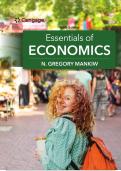Tenth Edition
Essentials of
ECONOMICS
N. GREGORY MANKIW
, Essentials of Economics:
a Guided Tour
Introduction
1 Ten Principles of Economics The study of economics is guided by a few big ideas.
2 Thinking Like an Economist Economists view the world as both scientists and policymakers.
3 Interdependence and the Gains from Trade The theory of comparative advantage explains how people
benefit from economic interdependence.
How Markets Work
4 The Market Forces of Supply and Demand
How does the economy coordinate interdependent economic
5 Elasticity and Its Application actors? Through the market forces of supply and demand.
6 Supply, Demand, and Government Policies The tools of supply and demand are put to work to examine
the effects of various government policies.
Markets and Welfare
7 Consumers, Producers, and the Efficiency
of Markets Why is the equilibrium of supply and demand desirable for
society as a whole? The concepts of consumer and producer
8 Application: The Costs of Taxation surplus explain the efficiency of markets, the costs of taxation,
and the benefits of international trade.
9 Application: International Trade
The Economics of the Public Sector
10 Externalities
Market outcomes are not always efficient, and governments
11 Public Goods and Common Resources can sometimes remedy market failure.
Firm Behavior and the Organization of Industry
12 The Costs of Production The theory of the firm sheds light on the decisions that lie
behind supply in competitive markets.
13 Firms in Competitive Markets
14 Monopoly Firms with market power can cause market outcomes
to be inefficient.
,The Data of Macroeconomics
15 Measuring a Nation’s Income The overall quantity of production and the overall price level
16 Measuring the Cost of Living are used to monitor developments in the economy as a whole.
The Real Economy in the Long Run
17 Production and Growth
18 Saving, Investment, and the Financial System These chapters describe the forces that in the long run determine
key real variables, including GDP growth, saving, investment,
19 The Basic Tools of Finance real interest rates, and unemployment.
20 Unemployment
Money and Prices in the Long Run
21 The Monetary System The monetary system is crucial in determining the long-run
behavior of the price level, the inflation rate, and other
22 Money Growth and Inflation nominal variables.
Short-Run Economic Fluctuations
23 Aggregate Demand and Aggregate Supply The model of aggregate demand and aggregate supply explains
short-run economic fluctuations, the short-run effects of
24 The Influence of Monetary and Fiscal Policy monetary and fiscal policy, and the short-run linkage between
on Aggregate Demand real and nominal variables.
, Suggestions for
Summer Reading
If you enjoyed the economics course that
you just finished, you might like to read more
about economic issues in the following books.
Abhijit V. Banerjee and Esther Duflo Mihir Desai
Good Economics for Hard Times The Wisdom of Finance: Discovering Humanity in the
(New York: PublicAffairs, 2019) World of Risk and Return
Two prominent economists—winners of the Nobel prize in (Boston: Houghton Mifflin Harcourt, 2017)
2019—offer their ideas about how to build a better world. A charming look at how the insights of finance inform our lives.
Yoram Bauman and Grady Klein William Easterly
The Cartoon Introduction to Economics The Tyranny of Experts: Economists, Dictators, and the
(New York: Hill and Wang, 2010) Forgotten Rights of the Poor
Basic economic principles, with humor. (New York: Basic Books, 2013)
A former World Bank economist examines the many attempts
Bryan Caplan to help the world’s poorest nations and why these attempts have
often failed.
The Myth of the Rational Voter: Why Democracies
Choose Bad Policies
(Princeton, NJ: Princeton University Press, 2008)
Milton Friedman
Capitalism and Freedom
An economist asks why elected leaders often fail to follow the
policies that economists recommend. (Chicago: University of Chicago Press, 1962)
One of the most important economists of the 20th century
Kimberly Clausing argues that society should rely less on the government and more
on the free market.
Open: The Progressive Case for Free Trade,
Immigration, and Global Capital
(Cambridge, MA: Harvard University Press, 2019)
Robert L. Heilbroner
The Worldly Philosophers
An economist explains why Americans benefit from interacting
(New York: Touchstone, 1953, revised 1999)
with the rest of the world.
A classic introduction to the lives, times, and ideas of the great
Avinash K. Dixit and Barry J. Nalebuff economic thinkers, including Adam Smith, David Ricardo, and
John Maynard Keynes.
The Art of Strategy: A Game Theorist’s Guide to Success
in Business and Life
(New York: Norton, 2008)
Steven E. Landsburg
The Armchair Economist: Economics and Everyday Life
This introduction to game theory discusses how all people—
(New York: Free Press, 2012)
from arrested criminals to corporate executives—should, and
do, make strategic decisions. Why does popcorn cost so much at movie theaters? Steven
Landsburg discusses this and other puzzles of economic life.




